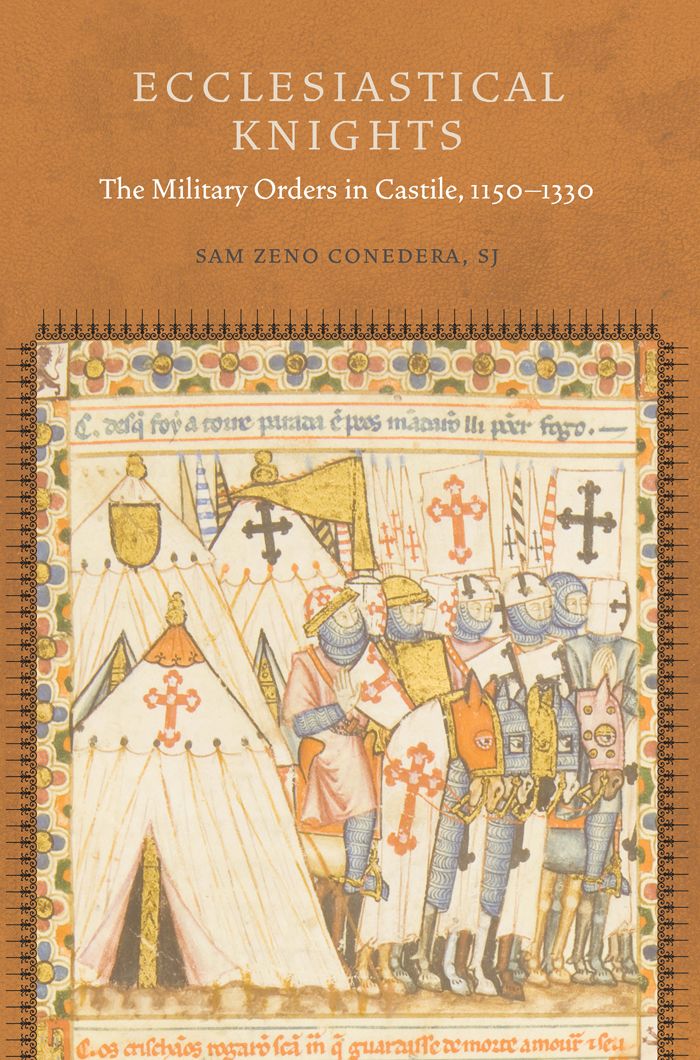Ecclesiastical Knights
The Military Orders in Castile, 1150-1330

This book can be opened with

“Warrior monks”—the misnomer for the Iberian military orders that emerged on the frontiers of Europe in the twelfth century—have long fascinated general readers and professional historians alike. Proposing “ecclesiastical knights” as a more accurate name and conceptual model—warriors animated by ideals and spiritual currents endorsed by the church hierarchy—author Sam Zeno Conedera presents a groundbreaking study of how these orders brought the seemingly incongruous combination of monastic devotion and the practice of warfare into a single way of life.
Providing a detailed study of the military-religious vocation as it was lived out in the Orders of Santiago, Calatrava, and Alcantara in Leon-Castile during the first century, Ecclesiastical Knights provides a valuable window into medieval Iberia. Filling a gap in the historiography of the medieval military orders, Conedera defines, categorizes, and explains these orders, from their foundations until their spiritual decline in the early fourteenth century, arguing that that the best way to understand their spirituality is as a particular kind of consecrated knighthood.
Because these Iberian military orders were belligerents in the Reconquest, Ecclesiastical Knights informs important discussions about the relations between Western Christianity and Islam in the Middle Ages. Conedera examines how the military orders fit into the religious landscape of medieval Europe through the prism of knighthood, and how their unique conceptual character informed the orders and spiritual self-perception.
The religious observances of all three orders were remarkably alike, except that the Cistercian-affiliated orders were more demanding and their members could not marry. Santiago, Calatrava, and Alcantara shared the same essential mission and purpose: the defense and expansion of Christendom understood as an act of charity, expressed primarily through fighting and secondarily through the care of the sick and the ransoming of captives. Their prayers were simple and their penances were aimed at knightly vices and the preservation of military discipline. Above all, the orders valued obedience. They never drank from the deep wellsprings of monasticism, nor were they ever meant to.
Offering an entirely fresh perspective on two difficult and closely related problems concerning the military orders—namely, definition and spirituality—author Sam Zeno Conedera illuminates the religious life of the orders, previously eclipsed by their military activities.
This is an important study both for the history of the military orders and the history of Medieval Spain. Elegantly, thoughtfully, persuasively, Conedera guides us towards the answer to a perplexing riddle: just why did so many knights consecrate their lives to God?——Damian J. Smith, St. Louis University
“Conedera’s book lets us sneak into the headquarters of Iberian ‘ecclesiastical knights’ and through the fascinating account of their virtues, shortcomings, devotions, and temptations convincingly illuminates the spirituality of their seemingly paradoxical nature.”——Martina Saltamacchia, University of Nebraska Omaha
...Ecclesiastical Knights presents a convincing and original portrait of the spirituality of the Castilian military orders and the status of their members as "ecclesiastical knights."—Comitatus
By focusing on the Iberian orders, who balanced their spiritual and martial needs, Conedera observes these orders in the complex religious landscape of the time and helps us to better understand the intricate functioning and interactions between the individual Iberian orders as well as between them and the various parts of medieval Church and society.—European Review of History
I highly recommend this book and would suggest its use in any class dealing with the medieval period and that
—James Bowden, H-Net Reviews
it be read by those with a non-academic though strong desire for historical knowledge and reading. It is well worth reading and chewing on the finer points of Conedera’s thesis.
This is an important work for students of the medieval military fighting orders, the medieval church, the Crusades, the complex social structure of medieval Iberia, or the more broadly international culture of knightly society. Conedera makes a very strong case, and we might hope that, unlike Dom Quixote, his quest to unseat the idea of the “warrior monk” is not taken in vain.—Journal of Military History
Ecclesiastical Knights is a lucid, original, and thoughtfully argued book. Conedera is to be commended not only for making the orders of Santiago, Calatrava, and Alcántara more accessible to anglophone scholars and students, but also for contributing to the wider debate on the place of the military orders in medieval society in a way that challenges us to rethink the common notion of "warrior monks."—Journal of Religious History
...offers a new perspective on the major historiographical question of how military orders brethren should be classified by focusing upon a group of military orders who—while they are encompassed by the debate—have not previously been a major source of inquiry.—Speculum
This book is, in sum, an excellent and innovative analysis that has the further advantage of raising new questions and, hopefully, renewing a much needed debate about the profile and role of these institutions.—Journal of the Historical Association

